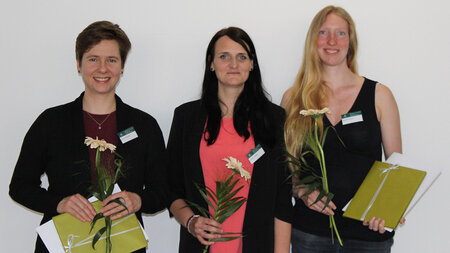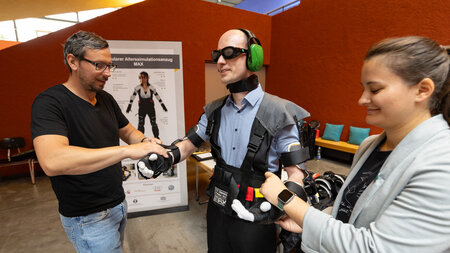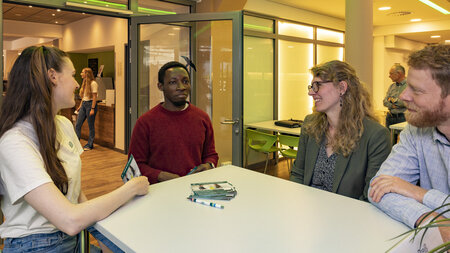Lecture Series gender_focused:
Various Career Paths by Female Scientists
Winter semester 2018 / 2019
24.10.2018
Prof. Dr. Hildegard Macha
Equality of Universities – Making Women Successful
07.11.2018
Prof. Dr. Yvonne Joseph
Mentoring Programmes as a Tool for the Advancement of Women – A report based on own Experiences
28.11.2018
Prof. Dr. Gabriele Schade
Gender and Diversity in Computer Science
05.12.2018
Susanne Witt, METROM Mechatronische Maschinen GmbH
additive + mobile – An Idea by Chemnitz is becoming a multi-technology carrier
16.01.2019
Dr. Alexandra Manske
Work and life in the cultural economy
23.01.2019
Dr. Eva Kieselstein, KIESELSTEIN International GmbH
Research and Development: novel 3D – Wire technology for lightweight construction
Prof. Dr. Hildegard Macha
Equality of Universities – Making Women Successful

The topic of equality and success for women at universities is a contemporary issue, due to the working conditions affecting women especially during their „rush hour of life“. The reconciliation of family and work is, due to short-term or even precarious working contracts, even more difficult, than internationality and independent research. Further difficulties include inequality of vocations as well as third-party funding ads. The efforts made by women have to, therefore, be made more visible and prejudices and barriers such as the „glass ceiling“ have to be diminished.
The initiating lecture of this lecture series will first present current data on women working in scientific fields and will elaborate on equality measures and the support the university provides for women pursuing careers. A positive career identity as a female scientist encourages oneself to pursue a scientific path.
Short Vita
Hildegard Macha was from 1992 till her emeritus status in 2012 chair of pedagogy, with the focus on adult education and extracurricular youth education at the University of Augsburg and since 2003 is the Women’s Representative of the University of Augsburg. Since 2007 she has been the head of the newly founded Gender Centre of Augsburg, which goal is third-party funding as well as the transfer from theory to practice. In addition to that, Hildegard Macha is a TCI-Trainer and is supervisor and coach. Her research specialisations are family, pedagogic anthropology, gender, education and equality.
Prof. Dr. Yvonne Joseph
Mentoring Programmes as a tool for the advancement of women – a report based on personal experience

Yvonne Joseph will talk about her experience with mentoring programmes at universities as a tool for the advancement of women- not only for the fields of natural sciences and technology. With regards to this topic, she will also talk about her career and her path to professorship.
Short Vita
Yvonne Joseph has been the female Professor for electronic and sensor materials since 2011 at the faculty for material science and material technology at the Freiberg University of Technology and Mining Academy. In addition to that, she is the director of the Institute for electronics and sensor materials, the Equality Commissioner, and the Woman’s Representative of the University. Before this, she was a guest lecturer at the faculty of chemistry at the University of Stuttgart and at the same time, she was a female researcher at Sony Germany GmbH in Stuttgart in the department for material science laboratories in the project “chemical sensors from linked metal-Nano particles”.
Prof. Dr. Gabriele Schade
Gender and Diversity in Computer Sciences
 Foto: MDR
Foto: MDR
First, this lecture will pursue the question of how gender and diversity fit into computer sciences. The answer to this question will be demonstrated by showing teaching content, forms of teaching in computer science at universities, and the process of software development. Challenges and results of a research project conducted on Thuringian Universities explicitly dealing with the above-named things will also be included and examined in this lecture.
Short Vita
Gabriele Schade was an active female professor for media computer sciences and software-engineering at the Erfurt College till the winter semester of 2017/18 but still has a lectureship there. A focal point of her teaching and researching activities is the participative software development with a particular focus on usability and user experience, software engineering and usability-engineering. She has been committed to the work of equality and equal opportunities in MINT-fields and has been vice chair of the board of trustees for the “Competencies Centre Technology-Diversity- and Equal Opportunities e.V.”.
Susanne Witt, METROM Mechatronische Maschinen GmbH
additiv + mobil – an Idea by Chemnitz becomes a multi-technology carrier

The spin-off company METROM from the Fraunhofer IWU Chemnitz came to being in 2001 with an idea for a new way of machine structure. Continuous development of the “5-Streben-Parallelkinematik” was established for the application in different branches. In the beginning, this was mainly used for sand molding work within the casting industry and was later on used for aluminium and steel chipping.
The first ever delivered systems are still in use today. Throughout the year’s different solutions for different requirements were created. With the five axels portable machine tool, working on large components on site was enabled. Next, to the metal cutting processes (drilling, milling, threading), additive procedures are now also integrated into the machine concept. By doing so, the customer now has access to an entirely new set of production possibilities.
Susanne Witt has led the family-owned company since 2016. You will receive an inside look at a company with a moving machine concept.
Short Vita
After her vocational training and further training to become an examined trade assistant and with work as head of the department for H&M Ludwigshafen, Susanne Witt studied Business Administration & Engineering at the TU Chemnitz. Since 2008, she has been a project engineer at METROM Mechatronische Maschinen GmbH, and since 2016, she has been the executive Managing Partner.
Dr. Alexandra Manske
Work and life in Cultural economics

Although culture and creative economy in Germany has become one of the most important labour market segments and is also referenced as a forerunner for new work and live models, one-third of all creatives cannot support their livelihoods with culture or creative work. Deep societal trenches pervade the culture and creative economy. Gender is one of these trenches. The lecture will highlight gender-specific inequalities and illustrated with the use of research results.
Short Vita
Alexandra Manske studied sociology and political science and taught as well as conducted research at different universities in Berlin such as the TU Berlin, Humboldt-University Berlin, Columbia University/NYC/USA, and the University of Hamburg. In 2005, she graduated with a doctoral degree from the Humbolt-University. Her doctoral thesis was about employment relationships in the IT sector and was published by the Hampp publishing house under the heading “Casualisation on a high level. A study about sole entrepreneurs in the IT sector”. In 2016, she habilitated at the TU Chemnitz. Her post-doctoral thesis was published in the Transcript-Verlag under the heading “Capitalist minds in cultural and creative industries. Creative minds between economic pressure and artistic urge”. She is currently investigating advocacy representatives/groups in the cultural sector with a focus on the independent scene of jazz musicians and performing artists in Hamburg and Berlin. In addition to that, she is a research associate at the Hafen City Universität Hamburg, and her primary research topics are work and society, cultural sociology, in particular, the field of artistic and creative economy, work and inequality sociology, especially forms of employment and milieu research as well as gender studies and qualitative social research.
Dr. Eva Kieselstein, KIESELSTEIN International GmbH
Research and Development: Innovative 3D Wire structure for Lightweight Construction

The lecture is about strucwire© - a new 3D wire structure for lightweight construction, which is an innovative application of the KIESELSTEIN International GmbH. Eva Kieselstein, who is the longstanding manager of the field of research and development, will not only present how the wire is produced, the manufacturing plants and its innovative application, but will also talk about her career path.
Short Vita
Eva Kieselstein studied materials engineering at the TH Karl-Marx-Stadt (now TU Chemnitz) and holds a doctorate in real structural research on rust stages. Till 1996, she was a scientific assistant in the field of materials analytics/composite materials at the TU Chemnitz. After that, she was a research associate and managing director at the Chemnitz Material Mechanics GmbH, with the focus on optical measuring technique. Since 2004, she is the manager of the field of research and development as well as the quality management officer at the KIESELSTEIN International GmbH (till 2013 KIESELSTEIN Group) in Chemnitz. The company develops and builds plant engineering for the wire-production, and it’s processing. The focus areas of the F&A-activities are among other things technology development and new wire structure for lightweight construction.






